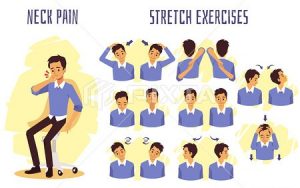Neck Pain Physiotherapy treatment in London, Belgravia, Clapham and Monument covered by Health insurances including BUPA, AXA, Cigna and more.
Get the best physiotherapists in London to treat 
Experienced Neck Pain and Stiff Neck Physiotherapist Specialist in London
At Excellence Physiotherapy London, our neck pain physios have many years of experience treating patients with acute and chronic neck pain in London. Our neck pain physiotherapist will asses the severity of your injury and offer appropriate treatmentprogram and exercises to relieve neck pain, You will be treated by some of the best physios in London and with the most efficient techniques learned during their post graduate specialisation.
Neck Pain physiotherapist in London at our practices in Monument Moorgate EC3, Belgravia SW1 or Clapham SW4.
Our neck pain physiotherapists can treat you at:
- Our clinic in Monument near Bank, Moorgate and London Bridge
- Our clinic in Belgravia Westminster near Victoria, Knightsbridge and Sloane Square
- Our 2 clinics in Clapham near Battersea and Balham (Clapham Common and Clapham South)
Our clinics are located within walking distance to the main Central London stations and are easy to reach from anywhere in London. If you cannot find a suitable appointment in your clinic of preference, you can choose any of the others as our clinics are located just 10-15 minutes travel from each other.
Neck pain Physiotherapist covered by Health Insurances and BUPA, AXA Cigna registered
Our physiotherapy and osteopathy treatments are covered by most health insurances and are Bupa registered & recognised (BUPA Global and BUPA UK), Axa registered & recognised (AXA International, AXA ppp), Cigna registered & recognised and WPA registered & recognised
For home visit physiotherapy, call : 0207 125 0262 / 0782 455 3765
If you are an Axa or Bupa patient, you cannot book online. Please call our office with your authorisation number.
If you cannot find an appointment that suits you, call us or send us a message: we will do our best to find you a slot.
What is neck pain? Where does neck pain come from?
Neck pain, or stiff neck is common pain, often caused by conditions such as cervical spondylosis, torticollis, whiplash or the consequences of trauma. To relieve neck pain and neck stiffness, and improve neck movement, many physiotherapy treatments are available. Osteopathy treatment for neck pain also has great results.
Is stiff neck or neck pain a common condition?
Neck pain is one of the most common musculoskeletal disorders, often associated with stiffness limiting neck movement. Cervical pain affects between 30 and 50% of adults and 67% of the population will suffer from an episode of neck pain during their lifetime.
Neck pain is usually spontaneous and mechanical, with no obvious cause, and resembles mechanical joint damage.
Why do I have neck pain? What are the causes of neck pain?
Neck pain can be caused by several factors. Neck pain or stiff neck is a very generic symptom that can correspond to various problems such as mechanical pain, torticollis, pain of inflammatory origin, pain of traumatic origin or pain of postural origin.
Torticollis, which is very common, is characterised by a sharp pain in the neck, which makes head movements difficult.You will feel that one side is more painful than another and that you cannot turn your head in the opposite direction of the pain in your neck. It can be caused by trauma or inflammation. Fortunately, this is often a mild problem that goes away on its own after a few days or gentle physiotherapy such as stretching, massage, trigger points…
Inflammatory neck pain, such as inflammatory rheumatism or spondyloarthritis, can be severe even at rest. Specific neck physiotherapy treatments can help reduce the pain and give movement back in the neck.
Traumatic pain, such as whiplash can also cause neck pain. This type of neck pain can be caused by a car accident or a fall that the body was not ready for. As your neck muscles weren’t ready for such a chock, they contracted themselves very quickly to protect the neck. But due to the intensity of the trauma, your neck muscles don’t relax and create an intense neck pain that can stay for months. For whiplash, it can be a good idea to treat the psychological aspect of the trauma in parallel with your neck pain physiotherapy treatment. This will help relax and feel better faster.
Mechanical neck pain is often caused by rheumatological pathologies such as cervical spondylosis. This condition is age-related and can affect women from the age of 35 and men from the age of 50.
Finally, neck pain can be of postural origin, caused by poor posture repeated daily like being seated for hours at a desk and computer with the same bad position everyday. This occupational disease, common among office workers, can be caused by poor eye position in relation to the screen, accumulated stress, a hunched back, etc.
The postural origin of the neck pain can also be due to a general bad posture. Take the example of a tall man, to keep looking at people eyes while talking to them, he will have the habit to hunch his back, which to keep the eyes on the horizon will then have to over curve his neck. Over time neck pain can appear and sometime be linked to a cervical hernia.
Postural and back strengthening will be a game changer on the long run. The physiotherapist will give you back strengthening exercises which will help you standing properly and so keep your neck in a correct position which will make your neck pain disappear if taken care of on time.
How to determine the cause of your neck pain or stiff neck
In case of neck pain or stiff neck, it is important to consult a physiotherapist to diagnose the cause of the neck pain and find the appropriate treatment. That’s why physiotherapists, neck specialists, will always start with a thorough assessment of the personal cause of your neck pain. They will ask you questions to understand when your neck pain started, if you have history of neck pain. Once the neck physio has found the cause of it, they will then be able to tailor for you a specific neck program with neck exercises which will reduce your neck pain until it is gone.
How to know if my neck pain is serious?
We often say that a simple neck pain or stiff neck with basic treatment should reduce in 24 to 48h. If after 48h your neck is still painful, you should receive a thorough assessment from a neck pain physiotherapist specialist to find the exact cause of your neck pain. After the assessment, the physiotherapist will be able to tell you if your neck pain is serious and what are your treatment or rehabilitation options.
In more serious cases, the physiotherapist might refer you for extra examination such as x-ray or MRI, or will refer you to an orthopedist specialised in complex neck pain.
Symptoms of neck pain: what do you feel when you have neck pain
Symptoms of neck pain, also called cervical spondylosis, are mainly characterised by pain in the neck, which can spread to other parts of the body such as the different parts of the neck, back of the head, shoulders, arms, upper back and even the arm, which is known as cervicobrachial neuralgia. Physical examination also shows neck stiffness, neck pain and decreased neck mobility. Patients may also experience headaches, eye strain, tingling in the arm, and dizziness.
What are the risk factors of musculoskeletal neck pain?
The risk factors for neck pain disorders are similar to those for back pain, such as:
- Obesity
- A high level of stress and job dissatisfaction
- The intensive practice of physical activities in inappropriate postures
- Spinal problems such as scoliosis or lordosis
- The use of an inappropriate pillow which may be flat, thick or not sufficiently supporting the head
- Smoking increases the risk of osteoporosis and fractures, reduces bone density and can lead to spinal degeneration
How to prevent neck pain?
It is possible to suffer from neck pain at any age if your posture and lifestyle are not correct. To avoid neck pain, here are some useful tips:
- Have a good bedding to avoid neck pain at night
- Avoid sleeping on your stomach so you don’t strain your neck muscles
- Check and adjust your working posture if necessary, ensuring that the screen is at eye level, the seat height is set correctly and the mouse pad is close to you
- If you have to sit for a long time, remember to stretch your neck and get up regularly
- Try to reduce your stress as much as possible because stress can make neck pain worse
- Finally, a good habit to form is to regularly do exercises to strengthen the neck muscles, such as rotation, tilt and strengthening exercises
It is important to note that all of these tips are general and neck pain can have many causes. To obtain personalised advices adapted to your situation, it is best to consult a health professional, such as a physiotherapist specialised in neck pain.

Treatments and physiotherapist advices for neck pain due to musculoskeletal disorders during the acute phase of the neck pain
How do I relieve my neck pain?
The first days that you feel neck pain is call the acute phase – here are a few physiotherapist advices to reduce the pain:
- Rest: It is advisable to limit large amplitude movements of the neck for a few days, while performing light stretches in the directions without pain. Cervical collars should be avoided as they can cause muscle weakness and lengthen the healing period.
- Ice: Applying ice to the painful area three to four times a day for 10 to 12 minutes is recommended to relieve inflammation. You can use ice cubes wrapped in a plastic bag or a wet towel, but avoid placing them directly on the skin to avoid frostbite.
- Medicines to relieve pain: Paracetamol (Tylenol, Atasol) is often enough to relieve moderate pain. Anti-inflammatories (ibuprofen, acetylsalicylic acid, naproxen, diclofenac) can also help, but they have more side effects. You can also use anti-inflammatory creams or muscle relaxants, but these can cause drowsiness.
- A doctor can help determine the best treatment for your neck pain based on your Opioid painkillers may be prescribed for severe pain, but they should only be used temporarily.
Physiotherapy treatment and advice from our physiotherapist for stiff neck, neck pain after the first 24 hours
When the neck pain subsides, after 24 to 48 hours, it is a good idea to practice careful and gradual stretching exercises several times a day.
It may be helpful to apply heat to the muscles just before starting the stretching exercises, using a moist compress warmed in the oven or a hot bath. The heat relaxes the muscles. Once the exercises are finished, ice can be applied.
Is Arnica or Arnica Montana effective against neck pain?
Yes, arnica oil or gel applied to the painful neck area has beneficial effects. Being a natural treatment, it can be repeated several times a day.
The German Commission E has approved the external use of arnica in the treatment of muscle and joint disorders, among others.
The ESCOP also recognises that arnica effectively relieves pain caused by a sprain or rheumatism.
What does a physiotherapist do for neck pain? What is physiotherapy treatment for stiff neck?
The main goal of physiotherapy treatment for neck pain and stiff neck is to relieve pain & tension and improve the mobility of the neck. It combines different techniques such as: deep tissue massages, antalgic physiotherapy, relaxation, manual mobilisation of the neck and neck traction, correction of the posture, manual therapy (similar to osteopathy), and trigger points.
- Physiotherapy massages for stiff neck, neck pain are designed to provide muscle relaxation, pain relief, and reduction of tension through the action of drainage and tissue mobilis Massage also allows better circulation of the blood and muscle relaxation.
- Antalgic physiotherapy, on the other hand, is a set of techniques that aim to reduce pain and inflammation. It can include techniques such as thermotherapy (cryotherapy or hot therapy) and electrotherapy.
- Relaxation: Stress and anxiety increase the symptoms of neck pain as they often contract your trapezes muscles which block your neck mobility. Relaxation, whether it is meditation or sophrology helps reduce your symptoms
- Physiotherapy Manual mobilization and traction of the neck and stretch of the neck muscle chains will relieve the cervical spine through gentle and progressive movements.
- Correction of the posture and statics of the cervical spine can be done through adapted rehabilitation exercises, self-aggrandisement and postural elongation. You will be given a set of exercises to do between your sessions to correct your bad posture in the long term to avoid your neck pain to relapse
- Busquet’s muscle chains are a tension release method that aims to restore tissue mobility for better dynamic and static body function. It is a specialised technique which can be classified under manual therapy but which is very efficient for neck pain and stiff neck.
- Manual therapy for the neck is a technique that aims to reduce pain, facilitate movement and unblock the joints. Manual therapy is very similar to osteopathy but it is done by physiotherapists
- The “Trigger Points”: Manual technique by pressure on a point to reduce muscle pain. Trigger Points are painful points in a muscle in motion or at rest. The search for the exact point that causes the same pain and the pressure on it allows a decrease in pain.
- Finally, it is important to practice a healthy lifestyle, such as learning the correct postures at work, using suitable bedding, and practicing non-restrictive sports activities to help reduce neck pain.
What are the best exercises for neck pain and stiff neck?
Looking to ease neck pain or stiff neck? Try these simple neck stretching exercises:
- Neck Extension: Gently raise your head and gaze upward, moving only your head backwards while keeping your shoulders and back still. Hold the stretch for 5 seconds at the farthest point without causing pain, then return to the starting position. This stretch targets the front of your neck and throat.
- Neck Flexion: Lower your chin towards your chest and look downward, only moving your head. Hold the stretch for 5 seconds at the most comfortable point, then return to the starting position. This stretch focuses on the back of your neck.
- Lateral Neck Flexion: Slowly tilt your head to one side, bringing your ear towards your shoulder while keeping your shoulders and back steady. Hold the stretch for 5 seconds at the farthest point, then repeat on the other side. This stretch targets the side of your neck.
- Neck Rotation: Keeping your back straight and shoulders still, slowly turn your head to the left and hold the stretch for 5 seconds at the farthest point without causing pain. Repeat on the right side. This stretch can be challenging, especially on one side. Start with partial rotation if full rotation causes pain.
It is recommended to start slowly with these stretches, especially if you have an acute, stiff and painful neck. Start with a single stretch per session and gradually increase the duration of the hold and number of sets. The goal is to improve neck flexibility and function, not to increase pain. If your neck pain subsides, consider incorporating a long-term routine of neck strengthening and stretching to prevent the pain from returning.
If you are an Axa or Bupa patient, you cannot book online. Please call our office with your authorisation number.
If you cannot find an appointment that suits you, call us or send us a message: we will do our best to find you a slot.


